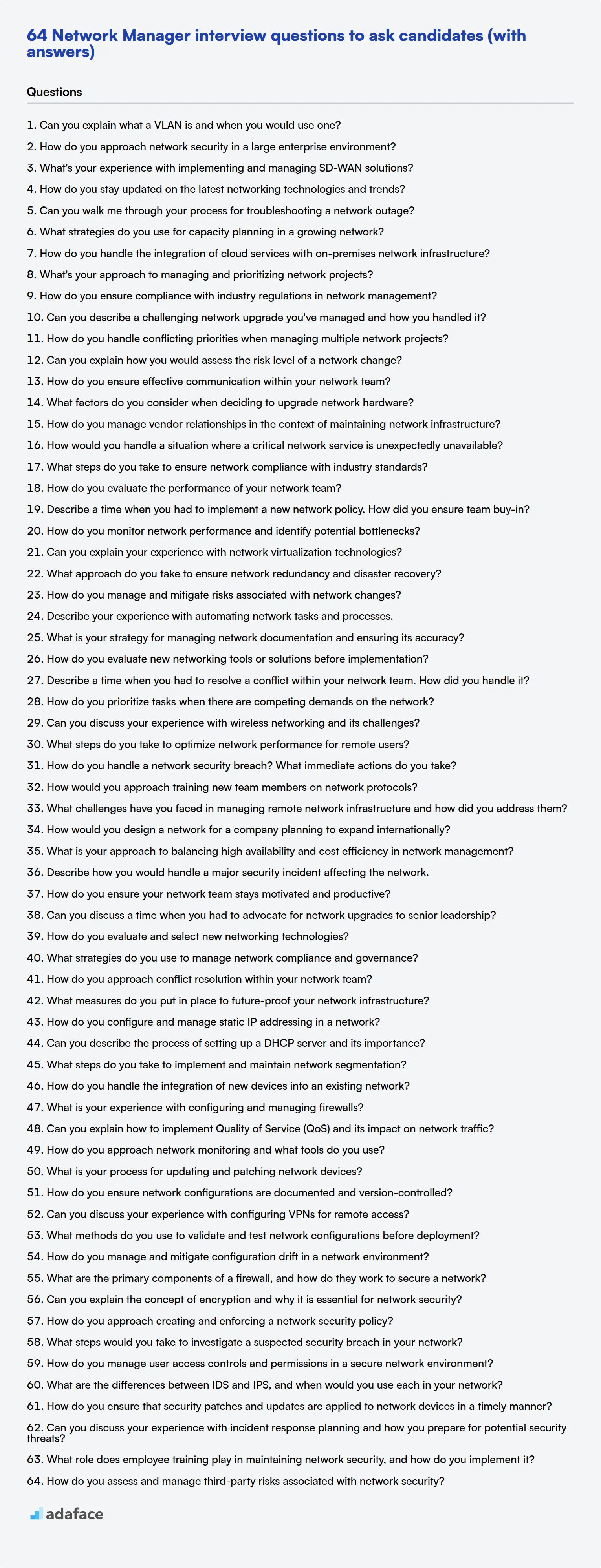Hiring the right Network Manager can significantly impact your organization's IT infrastructure and operations. Crafting the right set of interview questions is key to identifying candidates who possess skills required for a Network Manager, ensuring they align with your technical needs and the company's culture.
This blog post provides a comprehensive collection of interview questions tailored for Network Managers at various levels. From initiating conversations with prospective hires to delving into specific topics like system configurations and network security, we have compiled questions that will help you evaluate candidates effectively.
By using this guide, hiring managers can ensure they ask relevant and insightful questions, leading to better recruitment outcomes. Additionally, consider augmenting your hiring process with our network engineer test to streamline candidate evaluation before interviews.
Table of contents
10 Network Manager interview questions to initiate the interview
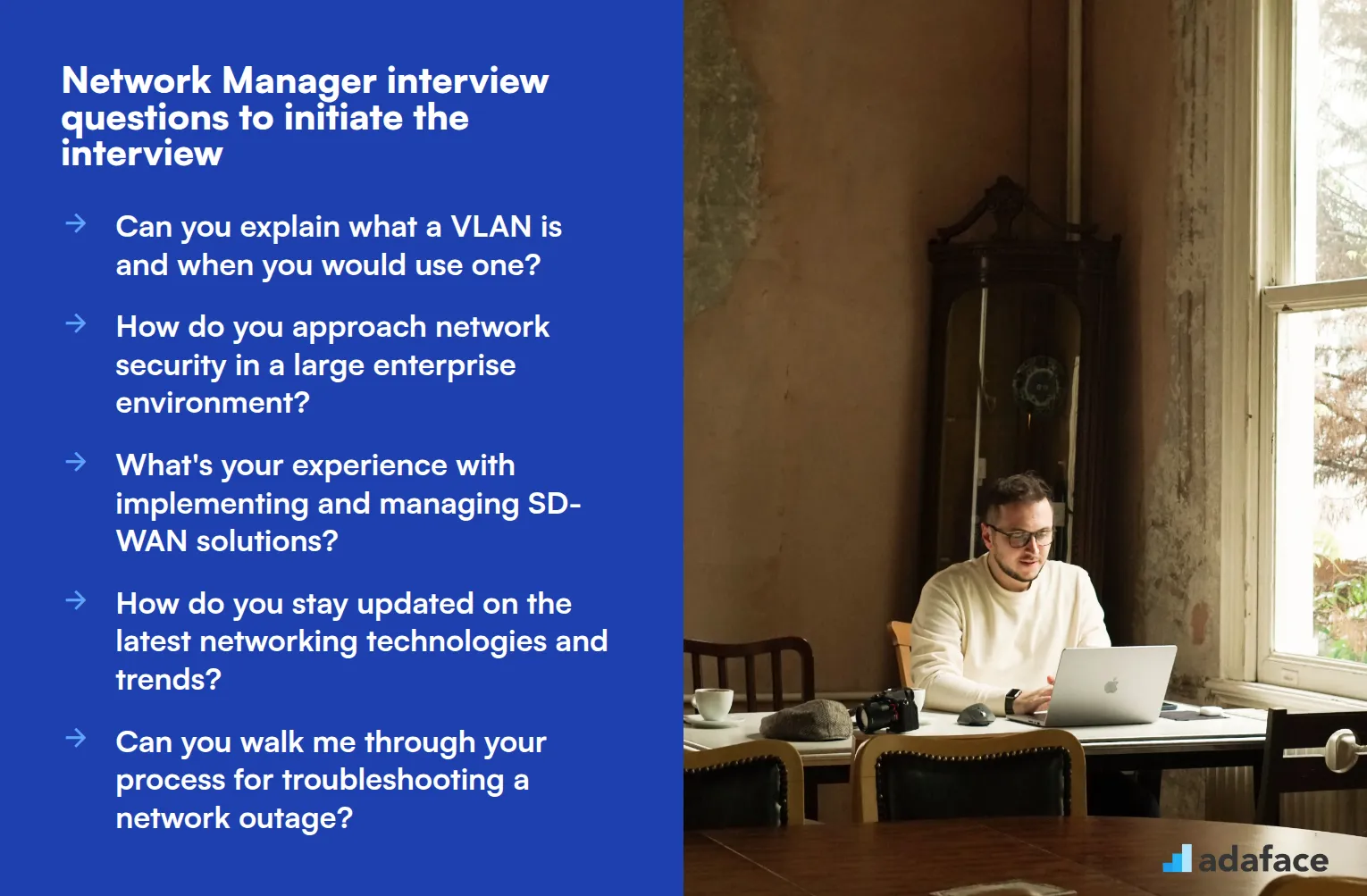
To kick off your interview with a Network Manager candidate, use these straightforward questions. They're designed to assess basic understanding and set the tone for a more in-depth discussion about the role's responsibilities and challenges.
- Can you explain what a VLAN is and when you would use one?
- How do you approach network security in a large enterprise environment?
- What's your experience with implementing and managing SD-WAN solutions?
- How do you stay updated on the latest networking technologies and trends?
- Can you walk me through your process for troubleshooting a network outage?
- What strategies do you use for capacity planning in a growing network?
- How do you handle the integration of cloud services with on-premises network infrastructure?
- What's your approach to managing and prioritizing network projects?
- How do you ensure compliance with industry regulations in network management?
- Can you describe a challenging network upgrade you've managed and how you handled it?
8 Network Manager interview questions and answers to evaluate junior managers
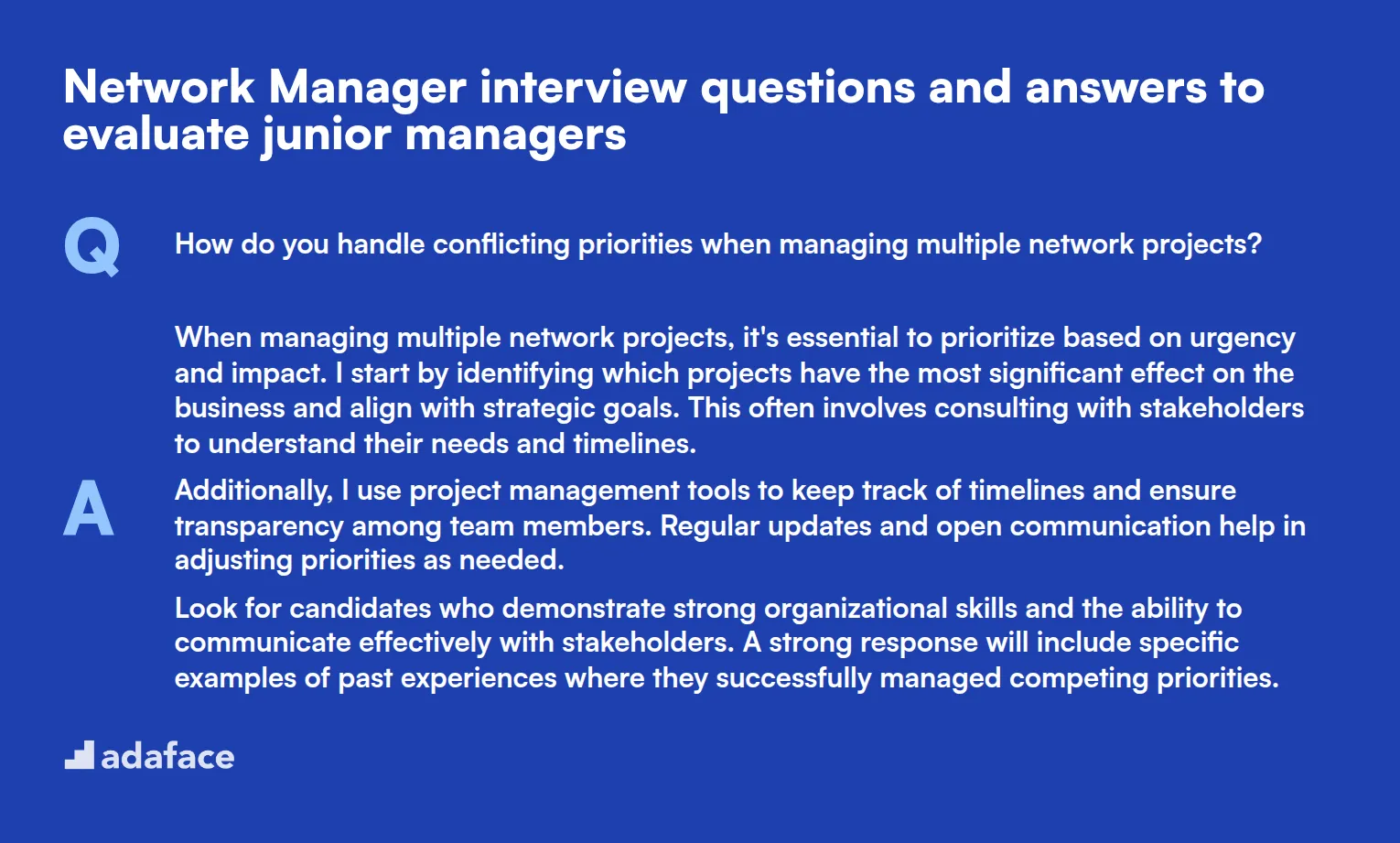
Finding the right junior network manager can feel like hunting for a needle in a haystack. To make this task a bit less daunting, use these interview questions to uncover candidates who not only grasp the basics but also have the potential to grow into exceptional network leaders.
1. How do you handle conflicting priorities when managing multiple network projects?
When managing multiple network projects, it's essential to prioritize based on urgency and impact. I start by identifying which projects have the most significant effect on the business and align with strategic goals. This often involves consulting with stakeholders to understand their needs and timelines.
Additionally, I use project management tools to keep track of timelines and ensure transparency among team members. Regular updates and open communication help in adjusting priorities as needed.
Look for candidates who demonstrate strong organizational skills and the ability to communicate effectively with stakeholders. A strong response will include specific examples of past experiences where they successfully managed competing priorities.
2. Can you explain how you would assess the risk level of a network change?
Assessing the risk level of a network change involves a few key steps. First, I would evaluate the potential impact on critical services and the likelihood of disruption. This assessment includes reviewing any dependencies and consulting with team members.
Next, I would develop a risk mitigation plan, which might involve scheduling changes during off-peak hours or implementing failover solutions. I also ensure that all changes are documented and communicated to relevant stakeholders.
Candidates should demonstrate an understanding of risk management principles and provide examples of how they've applied these in practice. Strong answers will reflect a proactive approach to risk assessment and mitigation.
3. How do you ensure effective communication within your network team?
Effective communication within a network team is crucial for smooth operations. I prioritize regular team meetings and use collaborative tools to keep everyone aligned on goals and tasks. These meetings serve as a platform for team members to share updates, discuss challenges, and brainstorm solutions.
Additionally, I encourage an open-door policy where team members feel comfortable bringing up concerns or ideas at any time. Clear documentation of processes and changes also plays a role in keeping communication transparent.
A candidate's response should highlight their communication strategy and how it fosters a collaborative team environment. Look for examples of how they've successfully improved team dynamics in the past.
4. What factors do you consider when deciding to upgrade network hardware?
When deciding to upgrade network hardware, several factors come into play. I consider the current performance of existing equipment, any compatibility issues with new technologies, and the scalability needs of the organization. Evaluating the cost-benefit ratio is also critical.
I also consult with the team to understand any pain points they might be experiencing with current hardware. This collective input helps in making informed decisions that align with both technical and business objectives.
Strong candidates will demonstrate an analytical approach to decision-making and provide examples of how they've successfully managed hardware upgrades. Look for their ability to balance technical needs with budget constraints.
5. How do you manage vendor relationships in the context of maintaining network infrastructure?
Managing vendor relationships is key to maintaining robust network infrastructure. I focus on building strong, transparent relationships by maintaining regular communication and setting clear expectations about performance and service levels.
I also conduct periodic reviews to assess vendor performance and ensure compliance with agreed-upon terms. This proactive approach helps in addressing issues early and fostering long-term partnerships.
An ideal candidate response should reflect their experience in vendor management and their ability to negotiate and maintain productive relationships. Look for specific examples of successful vendor collaborations.
6. How would you handle a situation where a critical network service is unexpectedly unavailable?
In the event of an unexpected outage of a critical network service, my first step would be to quickly assess the situation to determine the root cause. This involves checking system logs, alerts, and consulting with team members for any recent changes.
After identifying the issue, I would implement a fix or workaround to restore service as quickly as possible. Clear communication with stakeholders about the status and expected resolution time is essential during this process.
Candidates should demonstrate a methodical approach to troubleshooting and emphasize the importance of clear communication during incidents. Look for their ability to stay calm under pressure and efficiently coordinate with the team.
7. What steps do you take to ensure network compliance with industry standards?
Ensuring network compliance with industry standards involves staying updated on the latest regulations and implementing necessary policies and controls. I conduct regular audits and risk assessments to identify potential compliance gaps.
I also train the team on compliance requirements and best practices, ensuring everyone is aware of their responsibilities. Documentation and continuous monitoring are key components of maintaining compliance.
Look for candidates who have a strong understanding of industry standards and can provide examples of how they've successfully maintained compliance in previous roles. Their response should reflect a proactive approach to risk management.
8. How do you evaluate the performance of your network team?
Evaluating the performance of a network team involves setting clear, measurable goals and regularly reviewing progress. I use key performance indicators (KPIs) to track individual and team contributions to overall network performance.
Regular feedback sessions and performance reviews are conducted to discuss achievements and areas for improvement. I also encourage professional development to help team members achieve their potential.
Strong candidates should elaborate on their approach to performance management and how they foster a culture of continuous improvement. Look for examples of how they've successfully developed team members in the past.
15 intermediate Network Manager interview questions and answers to ask mid-tier managers.
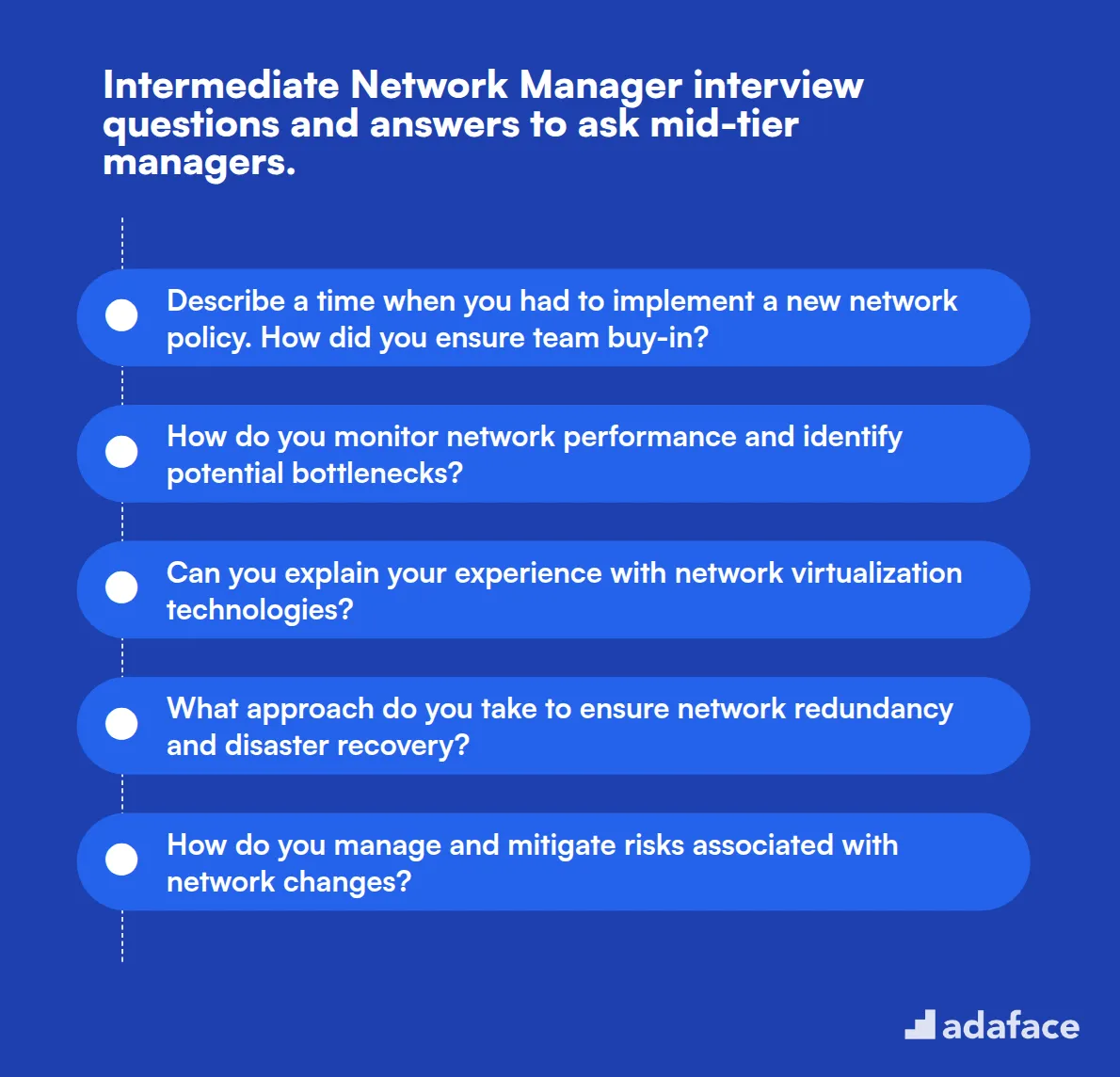
Interviewing mid-tier network managers requires a balance of technical depth and leadership insight. By incorporating these questions, you can effectively assess candidates' ability to manage complex network environments and lead their teams. For more on the skills required for this role, check out our Network Manager job description.
- Describe a time when you had to implement a new network policy. How did you ensure team buy-in?
- How do you monitor network performance and identify potential bottlenecks?
- Can you explain your experience with network virtualization technologies?
- What approach do you take to ensure network redundancy and disaster recovery?
- How do you manage and mitigate risks associated with network changes?
- Describe your experience with automating network tasks and processes.
- What is your strategy for managing network documentation and ensuring its accuracy?
- How do you evaluate new networking tools or solutions before implementation?
- Describe a time when you had to resolve a conflict within your network team. How did you handle it?
- How do you prioritize tasks when there are competing demands on the network?
- Can you discuss your experience with wireless networking and its challenges?
- What steps do you take to optimize network performance for remote users?
- How do you handle a network security breach? What immediate actions do you take?
- How would you approach training new team members on network protocols?
- What challenges have you faced in managing remote network infrastructure and how did you address them?
9 advanced Network Manager interview questions and answers to evaluate senior managers
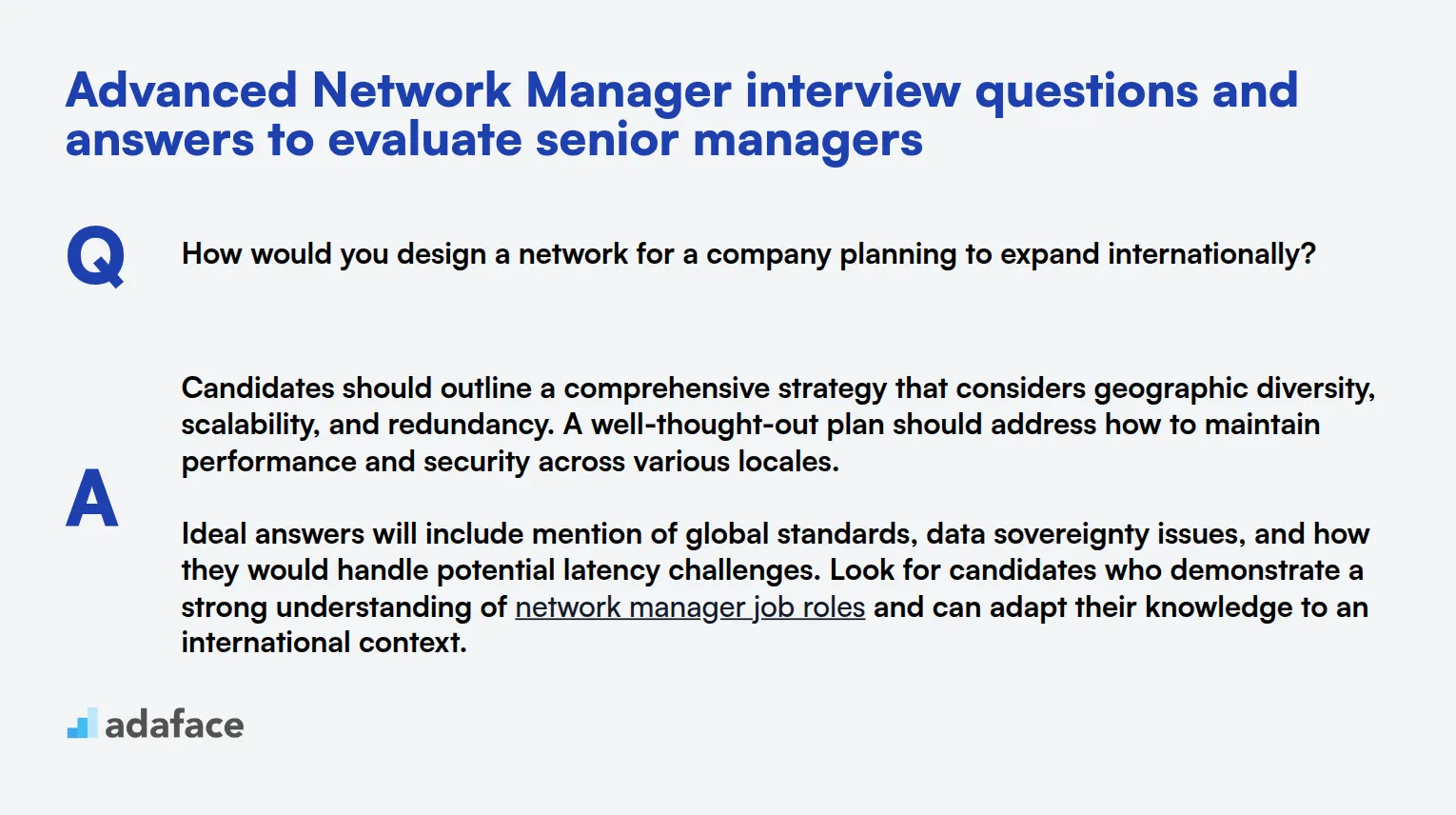
For evaluating senior network managers, it's crucial to dig deep into their strategic thinking and management skills. Use these advanced questions to assess candidates' ability to handle complex scenarios and lead your network infrastructure to success.
1. How would you design a network for a company planning to expand internationally?
Candidates should outline a comprehensive strategy that considers geographic diversity, scalability, and redundancy. A well-thought-out plan should address how to maintain performance and security across various locales.
Ideal answers will include mention of global standards, data sovereignty issues, and how they would handle potential latency challenges. Look for candidates who demonstrate a strong understanding of network manager job roles and can adapt their knowledge to an international context.
2. What is your approach to balancing high availability and cost efficiency in network management?
Senior managers should discuss implementing robust redundancy mechanisms without over-investing in unnecessary resources. They might mention strategies like load balancing, failover systems, and cost-efficient cloud solutions.
Candidates should be able to articulate how they evaluate the trade-offs between cost and availability. Look for a balanced approach that aligns with the organization's budgetary constraints while ensuring minimal downtime.
3. Describe how you would handle a major security incident affecting the network.
A clear response should include immediate containment and mitigation strategies, such as isolating affected sections and initiating predefined incident response protocols. Communication plans with stakeholders and legal considerations should also be part of the discussion.
Look for candidates who emphasize a structured incident response approach and the importance of post-incident analysis to improve future network security measures.
4. How do you ensure your network team stays motivated and productive?
Candidates should talk about fostering a positive team environment through clear communication, goal setting, and providing opportunities for professional development. Encouraging collaboration and recognizing achievements can also be key strategies.
An effective answer will highlight the candidate's ability to lead by example and maintain high morale even during challenging times. They should demonstrate an understanding of team dynamics and the importance of aligning team objectives with the organization's goals.
5. Can you discuss a time when you had to advocate for network upgrades to senior leadership?
Candidates should be able to articulate how they presented the technical and business benefits of the upgrade, using data and forecasts to support their case. The ability to translate technical needs into business language is crucial.
Strong responses will include examples of successful persuasion and how the upgrades positively impacted the organization's objectives. Look for candidates who can effectively communicate the value of investment in network infrastructure to non-technical stakeholders.
6. How do you evaluate and select new networking technologies?
A comprehensive evaluation process should include assessing compatibility with existing infrastructure, potential ROI, and vendor reliability. Candidates should also discuss testing and pilot phases to ensure the technology meets organizational needs.
Look for a methodical approach that considers both technical and business perspectives. Ideal candidates will be proactive in staying updated with industry trends and can identify technologies that provide competitive advantages.
7. What strategies do you use to manage network compliance and governance?
Candidates should mention establishing clear policies, regular audits, and continuous training for network team members. They should also discuss the importance of staying informed about regulatory changes and adapting policies accordingly.
An ideal response will emphasize a proactive approach to governance and compliance, ensuring that the network aligns with industry standards and legal requirements.
8. How do you approach conflict resolution within your network team?
Conflict resolution strategies should include open communication, active listening, and seeking mutually beneficial solutions. Candidates might discuss mediation techniques and fostering an environment where diverse opinions are valued.
Look for candidates who demonstrate strong leadership and interpersonal skills, emphasizing the importance of maintaining a cohesive and productive team atmosphere even in the face of disagreements.
9. What measures do you put in place to future-proof your network infrastructure?
Candidates should discuss strategies like adopting scalable architectures, investing in flexible and adaptable technologies, and maintaining a forward-looking mindset regarding technological advancements.
An effective answer will show the candidate's ability to anticipate future trends and challenges, ensuring the network can evolve with the organization's needs. Look for strategic planning and a focus on long-term sustainability.
12 Network Manager interview questions about system configurations
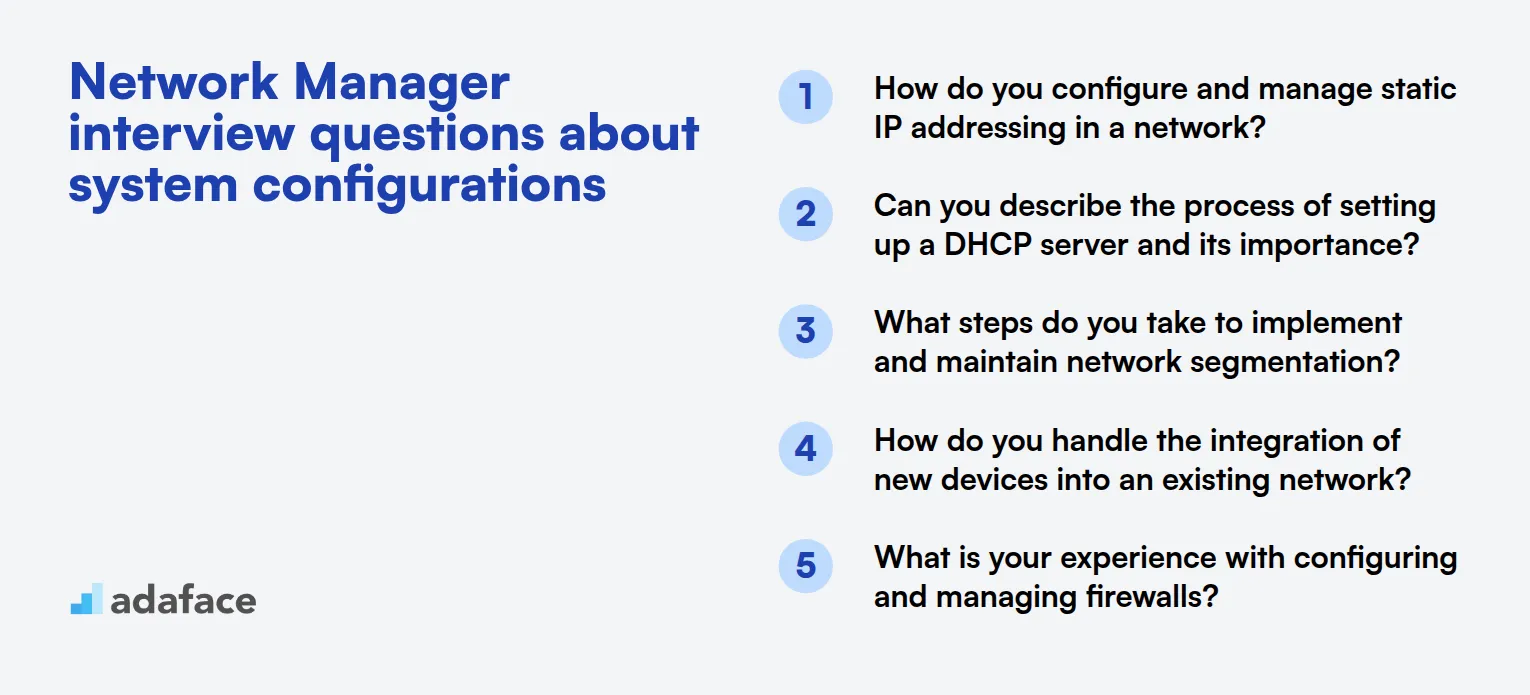
To gauge an applicant's proficiency in handling network configurations, utilize these targeted questions. They can help you assess not only technical skills but also the candidate's ability to adapt to evolving networking demands. For a comprehensive understanding of the role's requirements, refer to our detailed job description.
- How do you configure and manage static IP addressing in a network?
- Can you describe the process of setting up a DHCP server and its importance?
- What steps do you take to implement and maintain network segmentation?
- How do you handle the integration of new devices into an existing network?
- What is your experience with configuring and managing firewalls?
- Can you explain how to implement Quality of Service (QoS) and its impact on network traffic?
- How do you approach network monitoring and what tools do you use?
- What is your process for updating and patching network devices?
- How do you ensure network configurations are documented and version-controlled?
- Can you discuss your experience with configuring VPNs for remote access?
- What methods do you use to validate and test network configurations before deployment?
- How do you manage and mitigate configuration drift in a network environment?
10 Network Manager interview questions about network security
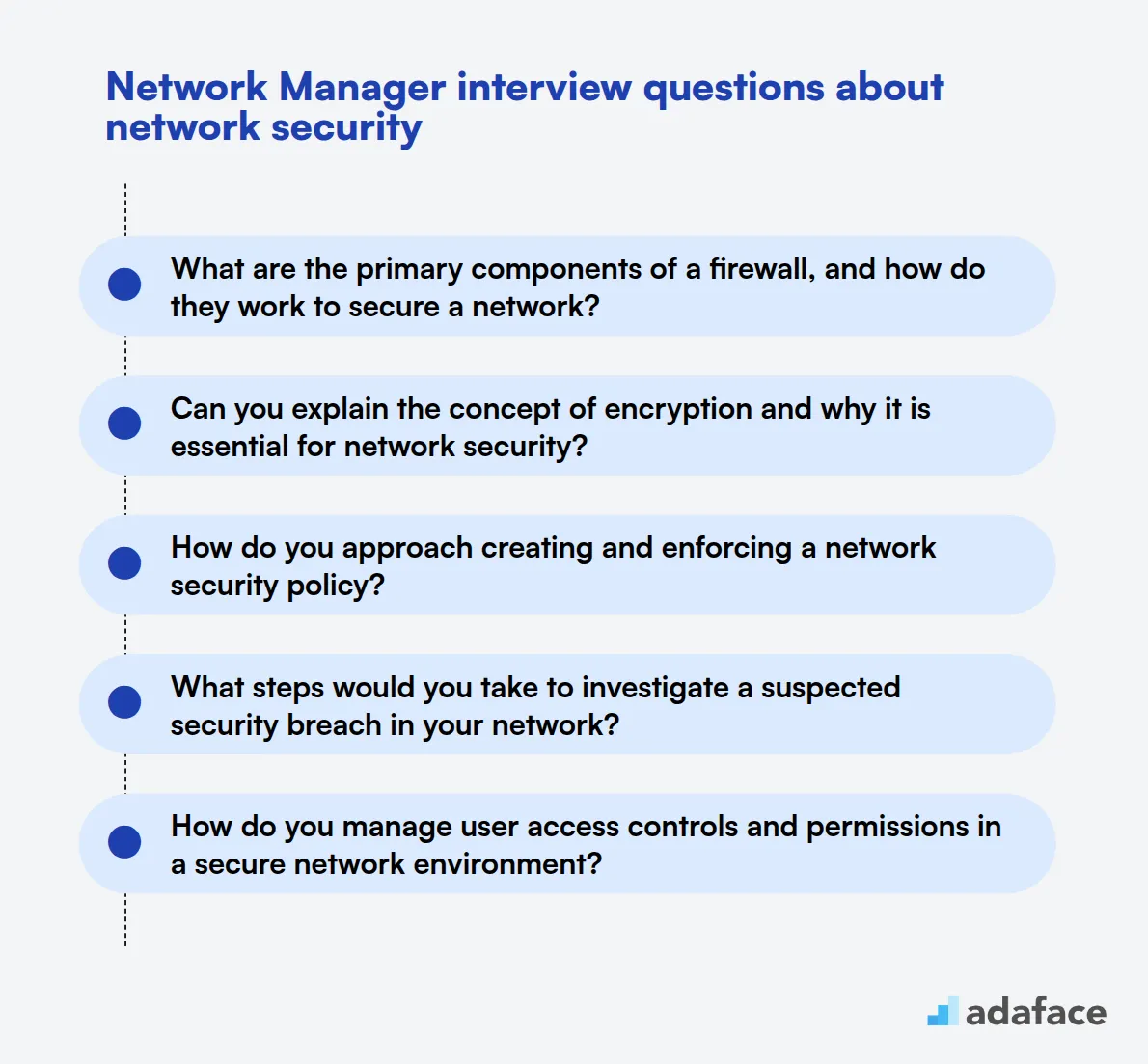
To assess whether candidates possess the necessary knowledge to protect your network from threats, use these targeted network security questions. They will help you gauge the candidate's understanding of vital security practices and their ability to implement effective measures that ensure your organization's safety. For more insights on network manager roles, consider the following questions.
- What are the primary components of a firewall, and how do they work to secure a network?
- Can you explain the concept of encryption and why it is essential for network security?
- How do you approach creating and enforcing a network security policy?
- What steps would you take to investigate a suspected security breach in your network?
- How do you manage user access controls and permissions in a secure network environment?
- What are the differences between IDS and IPS, and when would you use each in your network?
- How do you ensure that security patches and updates are applied to network devices in a timely manner?
- Can you discuss your experience with incident response planning and how you prepare for potential security threats?
- What role does employee training play in maintaining network security, and how do you implement it?
- How do you assess and manage third-party risks associated with network security?
Which Network Manager skills should you evaluate during the interview phase?
While it's impossible to gauge everything about a candidate in a single interview, evaluating the right skills can provide critical insights. For Network Manager roles, certain skills are paramount, setting the stage for a productive and secure IT environment.
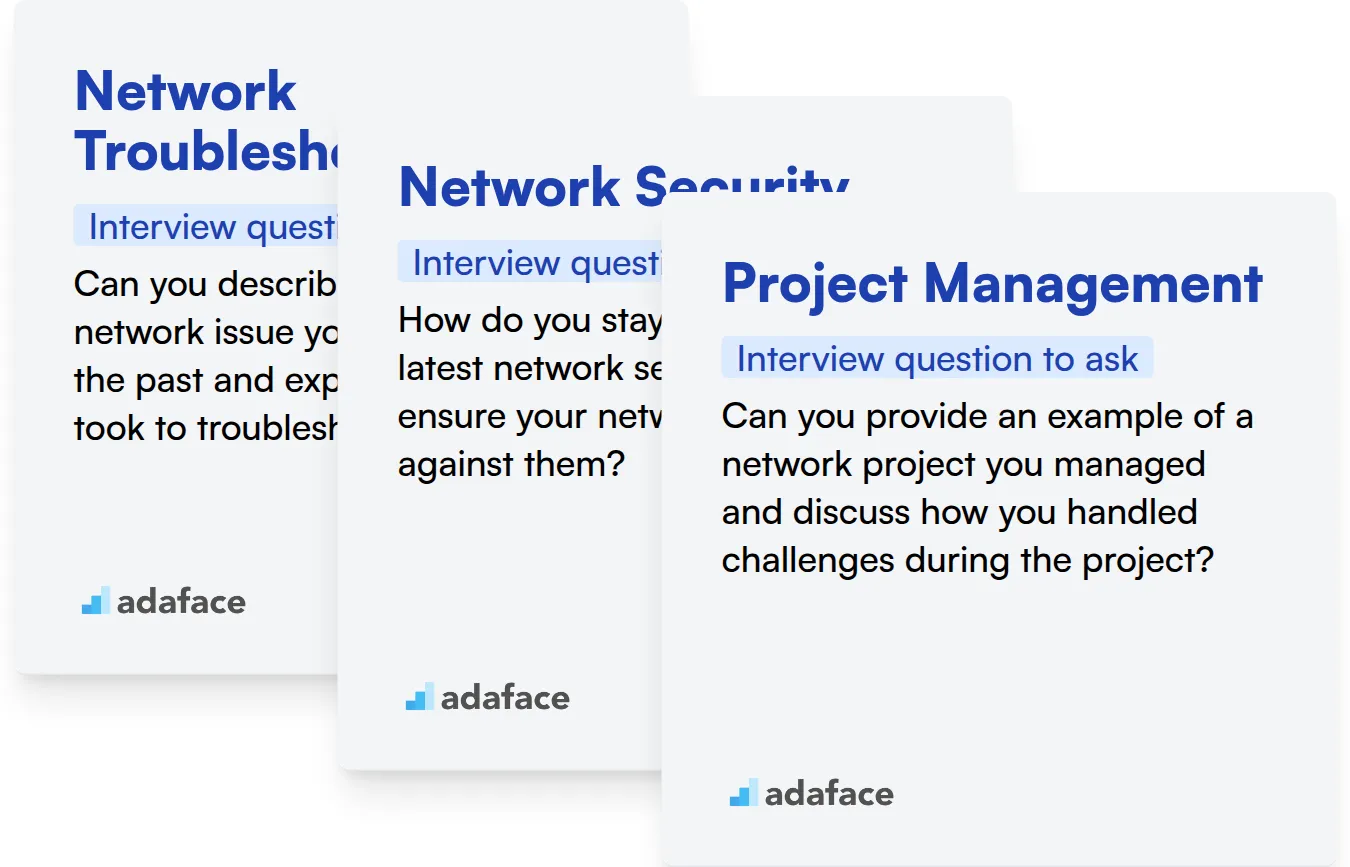
Network Troubleshooting
To assess a candidate's troubleshooting skills, consider using an assessment test that includes relevant MCQs to filter candidates effectively.
Interviewers can also ask targeted questions to evaluate a candidate's ability to troubleshoot network issues.
Can you describe a challenging network issue you've resolved in the past and explain the steps you took to troubleshoot it?
When asking this question, look for candidates who articulate their problem-solving process clearly, including identifying the root cause, the steps taken to resolve the issue, and the preventative measures implemented.
Network Security
Consider using the cyber-security-test for evaluating candidates' expertise in network security through comprehensive MCQs.
It's beneficial to ask candidates specific questions regarding their approach to network security.
How do you stay updated on the latest network security threats and ensure your network is protected against them?
Candidates should demonstrate awareness of current security trends and practices, as well as a proactive approach to updating policies and implementing protective measures.
Project Management
An assessment can effectively gauge project management abilities through scenario-based MCQs.
To assess project management skills during an interview, consider asking about their experience with leading network projects.
Can you provide an example of a network project you managed and discuss how you handled challenges during the project?
Look for responses that highlight the candidate's ability to plan, prioritize, and adapt to changes while maintaining project goals and deadlines.
Hire top talent with Network Manager skills tests and the right interview questions
When looking to hire someone with Network Manager skills, it’s important to verify that candidates truly possess these skills. A thorough assessment will help ensure you are selecting candidates who can effectively manage your network infrastructure.
The most efficient way to evaluate these skills is by utilizing skills tests. Consider using our Network Engineer Test or Cisco Routing and Switching Test to accurately gauge candidates' capabilities.
Once you have conducted the tests, you can easily shortlist the best applicants for interviews. This approach streamlines your hiring process and helps you focus on candidates who meet your requirements.
To get started, visit our test library to explore more assessments and sign up for the platform. Making informed hiring decisions has never been easier.
Network Engineer Online Test
Download Network Manager interview questions template in multiple formats
Network Manager Interview Questions FAQs
A Network Manager should have strong technical skills in network protocols, security, and troubleshooting, as well as leadership and communication abilities.
Use a combination of technical questions, scenario-based inquiries, and discussions about past projects to gauge their experience and expertise.
Focus on network security, system configurations, problem-solving skills, team management, and knowledge of current networking technologies.
Combine technical interviews with skills assessments, and consider the candidate's ability to align with your organization's goals and culture.

40 min skill tests.
No trick questions.
Accurate shortlisting.
We make it easy for you to find the best candidates in your pipeline with a 40 min skills test.
Try for freeRelated posts
Free resources




